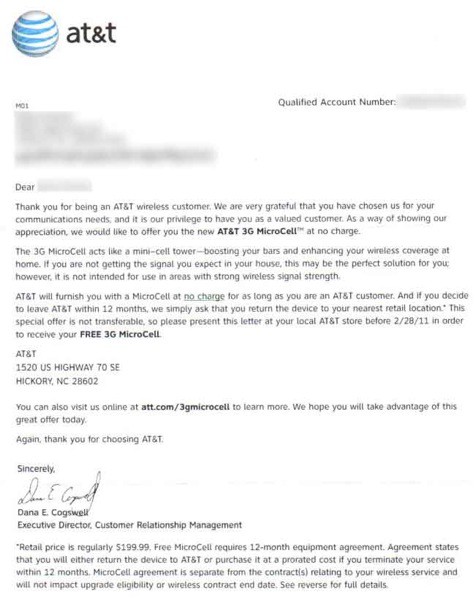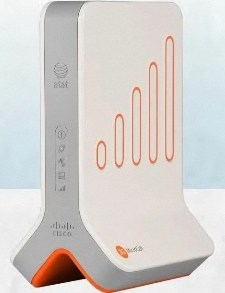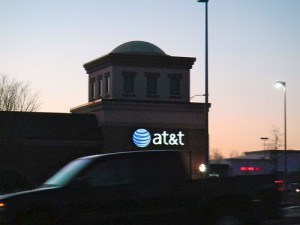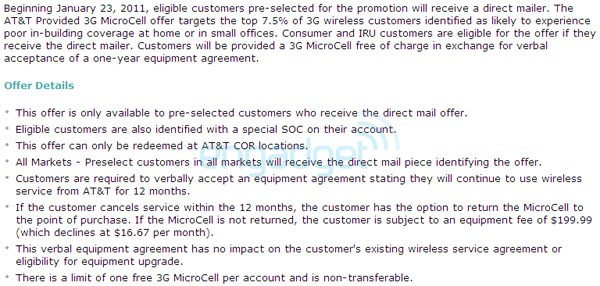 Here in West Virginia, cell phone reception is often by the grace of God. The incredibly mountainous state makes “line of sight” communications a real problem when the nearest cell tower is blocked by a gigantic shale rock formation someone blasted through to build a road decades earlier.
Here in West Virginia, cell phone reception is often by the grace of God. The incredibly mountainous state makes “line of sight” communications a real problem when the nearest cell tower is blocked by a gigantic shale rock formation someone blasted through to build a road decades earlier.
AT&T probably still delivers the largest coverage of rural areas in the state because its towers expand beyond the major highways other carriers cover. But even with that expanded service, using a smartphone indoors is going to be a problem in many places.
Recently, AT&T sent letters to approximately 7.5 percent of their customers in the rural areas most likely to have reception problems, offering a free “MicroCell,” which is comparable to a mini cell tower inside your home or office. The equipment works with your existing broadband connection to expand “coverage” inside your home. For data purposes, the MicroCell doesn’t deliver anything your personal Wi-Fi connection couldn’t, but if you rely on a cell phone, having signal bars makes all the difference if you are waiting for an important call.
A considerable number of those letters reached families in West Virginia, and that is no surprise considering the state is by far the most difficult to blanket with wireless coverage in the eastern half of the country.

A letter to AT&T customers inviting them to receive a free MicroCell
But the problem is, some families are receiving the free offers, while others are not, and that is creating reception envy.

AT&T 3G MicroCell
Charlotte, who lives in Whipple, W.V., outside of Oak Hill, was visiting with her neighbor Joy last week and noticed her husband fiddling with the latest gadget on his computer desk.
“It looked odd because of the way it spread out on the bottom, so I asked Joy what in the world he was installing,” Charlotte says.
“It’s a cell tower thing AT&T gave us to get better reception,” Joy responded.
Despite the fact the two families live only a few homes apart and signed up for AT&T service with the exact same phones within weeks of each other, Charlotte was never offered AT&T’s MicroCell.
AT&T notified qualified customers with a letter containing a personal reservation code, and the offer was not transferable.
“Maybe you got it and threw it away,” Joy offered.
“No, ever since the credit card companies started changing terms on us, we open every envelope that comes into this house,” Charlotte replied.
Assuming it must be an oversight, Charlotte dropped by her local AT&T store to inquire about the offer.
“We quickly learned we were not the first family to bring up this issue with AT&T as the store manager told us he was fielding complaints from all over town about the highly-selective offer,” Charlotte said.
Even worse, there was nothing the manager could do to rectify the situation.
“His hands were as tied as my patience was tried,” Charlotte tells Stop the Cap!
“The store manager offered to sell me the MicroCell for around $100 with a rebate, but why should I pay AT&T for better reception they should already be providing?” Charlotte asks. “It seems to me if they are giving away these things to some people in a neighborhood, they should be doing it for everyone, because we pay the same bill our neighbors do.”
The seemingly random offers of MicroCell units are not limited to West Virginia. We’ve noticed complaints from residents in northern California, the Pacific Northwest, and northern New England from others who get reception while outdoors or on the go, but find their phones useless for making and receiving calls at home.
In most cases, irate customers seeking redress from AT&T run into a bureaucratic brick wall.
Rick McGee, commenting on Engadget’s website:
I have talked to Marketing, Technical Support, and my local store, and nobody can tell me who to contact to qualify for a MicroCell. I have been an AT&T Mobility customer for over four years, with four family plan phones and two more phones on corporate contracts. The reception at my house is usually zero, at times maybe one bar, but never enough to maintain an incoming call or make an outgoing call. I guess I am a glutton for punishment, but this is the last straw.
If AT&T does not magically send me one of the MicroCell coupons, I will total up my termination fees and determine the earliest date I am willing to dump AT&T and try another carrier. In addition to the cell phones, I have two AT&T land lines, plus an AT&T internet account, so I am likely in the top tier of residential customers. With no reception at my house, I don’t see how I would fail to qualify for a MicroCell, but AT&T has no process to help individual customers with bad reception. Everyone I talk to claims ignorance. I’ve done my part, AT&T — either step up, or I am gone.
 Others find similar experiences — apologies from in-person sales staff about the corporate roadblocks even they cannot navigate around.
Others find similar experiences — apologies from in-person sales staff about the corporate roadblocks even they cannot navigate around.
But every once in awhile, one does. Casey Robinson’s neighborhood lost all AT&T cell phone service when their local cell tower was destroyed in a storm. The replacement redirected most of its signal elsewhere, leaving them with no bars.
After arguing with corporate phone support in the AT&T store for 2 hours they told me pay the $149 [for a MicroCell] or tough luck. I responded by telling them to take my family plan +2 lines, my roommates family plan +3 lines, and our Uverse U400 package with high speed internet and shove it, we will be changing carriers immediately since I have tower data from AT&T pre and post storm to show they breached our contract.
The AT&T store rep was amazing through all of this. He apologized continuously and said if it was up to them they would give out the MicroCell as soon as we walked in the door, unfortunately their computers physically block them from comping a MicroCell. While I was very distraught on the phone with AT&T, he called his manager at home and explained the situation. She drove in to the store, again apologizing for everything we had to go through, checked us out with the MicroCell then credited our account for the full purchase price and credited a month’s service to both my line and my roommate’s line for the issues we had been having. They are the only reason we still have AT&T. Of course we wrote to their district manager and AT&T corporate applauding the employee and manager, and of course from what we’ve heard they still haven’t been acknowledged for their good work.
Some others have had recent success filing complaints with the Better Business Bureau, when executive level customer service representatives come to the rescue with a free MicroCell.
Charlotte’s family intends to deal with the MicroCell Gap in their own way — by switching to Verizon Wireless, which improved service in the Oak Hill region a few years ago while they’ve been under contract with AT&T.
“We were willing to put up with the MicroCell doing the job their own cell towers should be doing, but because they don’t care about us, we’re done with them,” Charlotte says.
Customers accepting AT&T’s free offer must verbally commit to stay with the carrier at least 12 months or return the MicroCell when they depart. If they don’t, AT&T will bill an equipment fee up to $199.

Engadget obtained this inside memo about the MicroCell offer.


 Subscribe
Subscribe





